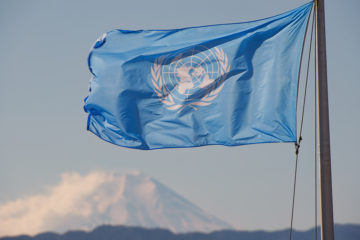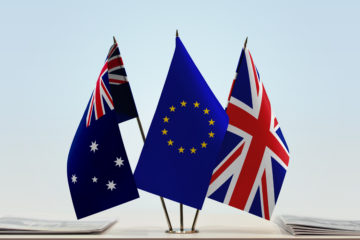OxPol BlogCast Episode 2: The Milk Tea Alliance
Welcome to the OxPol Blogcast, a podcast where we will be sharing research, analysis, and experiences from members of the University of Oxford’s Department of Politics and International Relations. On each episode, we will talk to a guest about a piece they’ve written for the OxPol Blog. Then, we’ll discuss their larger research agenda, their insights on conducting political science, and their time at Oxford. On the 2nd episode of the OxPol BlogCast, host Chase Harrison talks to MPhil students Jasmine Chia and Scott Singer about the Milk Tea Alliance and its relationship to 20th century black anti-colonialists. They also discuss the movement to decenter International Relations scholarship. Read the original blog post here: https://blog.politics.ox.ac.uk/the-new-worldmakers-how-the-20th-century-black-anticolonial-dialogue-reveals-the-strategic-importance-of-the-milk-tea-alliance/
The New ‘Worldmakers’: How the 20th Century Black Anticolonial Dialogue Reveals the Strategic Importance of the Milk Tea Alliance
Growing tension in Berlin. A proxy war in Korea. The escalating Space Race. The world—and particularly its realists—focused on the evolving great power competition between the United States and Soviet Union during the Cold War. However, in the shadows of this marquee battle, black leaders such as Kwame Nkumrah, Eric Williams, and George Padmore drove an anticolonial dialogue that sought to transform the international order on their own accord. Their core mission: to reframe sovereignty, reconceptualising it as self-determination and the elimination of racial hierarchy. This weighty conversation, which took place from the 1950s to the 1980s, doesn’t seem related to an Asian meme war in 2020. However, amidst a new, growing Cold War between the U.S. and China, the ‘Milk Tea Alliance’ has emerged as the newest supranational …

The Global Inequity of Emissions Consumption: Carbon Accounting as the Future Stepping-Stone in International Climate Negotiations
As the host of the postponed COP26 climate summit, the UK has set out the ambitious goal to convince all countries to commit to reach net zero emissions as soon as possible within their mandatory climate targets. Reducing overall emissions remains the paramount task of global climate governance. However, an overlooked but defining question concerns carbon accounting—the methodology of how national CO2 emissions are assessed. The conventional territory-related production approach, which has traditionally been used in climate governance, stands in contrast to an often ignored consumption-based approach, which more closely captures emissions embodied in the domestic end-use of energy and goods. This article lays out why the seemingly dull and technical matter of carbon accounting has the potential to become the future stepping-stone for a global consensus on …
Have We Finally Moved Past the Unilateral Age of Apollo? The Artemis Accords, Explained
The United States, under the Trump administration, has aimed to excite interest in space activities, including through the highly publicised creation of the Space Force and the manned space flight missions with SpaceX. Importantly, the announcement of the Artemis Accords in mid-May is an extension of such an effort. The Accords are envisioned as a set of bilateral agreements with the intent to return astronauts to the moon and beyond. Led by the United States and a series of commercial and international partners, they mark a seminal development in the outer space governance regime. As the United States and its international partners venture to create and strengthen outer space governance, non-space faring nations must be included in future agreements to ensure they are not systematically excluded from accessing lunar resources and development opportunities. The Artemis Accords program is spearheaded by the National Aeronautics …
The Health-Security Nexus: Reassessing Priorities after Covid-19
While Covid-19 has spurred debate about the need to elevate public health as a security concern, the securitisation of health presents both opportunities and trade-offs that need to be considered if we are to reallocate military spending to prepare for the next pandemic. The devastating toll of the Coronavirus pandemic has ignited a debate about the intersection of public health and national security. Once recognised as global leaders in pandemic preparedness, the United States and the United Kingdom have struggled to integrate policy responses to Covid-19 into existing security frameworks and to allocate resources accordingly. Indeed, public health spending in both countries pales in comparison to spending on counter-terrorism, even though more American lives have been lost to the pandemic than in all US wars since World War II and the number of Covid-19 deaths in the UK far exceed those attributed to terrorism in the last 50 years. Consequently, some academics and policymakers have questioned whether the prevailing notion of national security—a state’s capacity to defend its territory and …
Shinzo Abe or Abe Shinzo: From Western Order to International Order?
To what extent is the international community truly international? And, to what extent are non-Western norms and practices excluded? The choice of language in international relations is one important aspect of this broad topic. Each international organization has official languages. The United Nations, for example, has six official languages, and the European Union 24, though only three – English, French and German – are used in procedures of the Commission. The choice of language is partly driven by the need to communicate to the widest number of people, but it also has an endogenous relationship with state power. Powerful states promote the languages they use, and in turn, others must learn their languages to participate, propagating their power. An important aspect of the choice of …

Book Review: Richard Caplan’s “Measuring Peace: Principles, Practices and Politics”
In Measuring Peace, Professor Richard Caplan of the University of Oxford has written an insightful guide for students and practitioners of peace. The book will help those who want to understand the fundamental principles and existing practices of how to assess peace while at the same time outlining some critical political constraints. Caplan provides a succinct and clear analysis of key approaches to peace measurements, their weaknesses and ways to move forward. Due to its accessibility and policy relevance, the book also stands out among other publications that have sought to evaluate and grapple with the question of how to judge the quality of existing peace. The key aim of the book is to give peacebuilders a ‘compass’ to navigate the post-war peace …

What the History of Australian Independence can tell us about Britain’s Journey ahead
Debates over Brexit have been “dominated by a yearning for restoring UK sovereignty”. The Brexit vote during June 2016 was declared as an independence day by key members of the leave campaign. Similarly, such sentiments have been used about the exit day on which the UK is to leave the EU under the European Union (Withdrawal) Act Independence is often perceived as one decisive moment – a clean break with the past and a new beginning. However, this article posits that independence might be better thought of as a gradual process, characterized by both change and continuity. Taking the example of the development of Australia’s foreign policy post-federation, the article showcases that de jure sovereignty does not automatically or immediately result in de facto …









